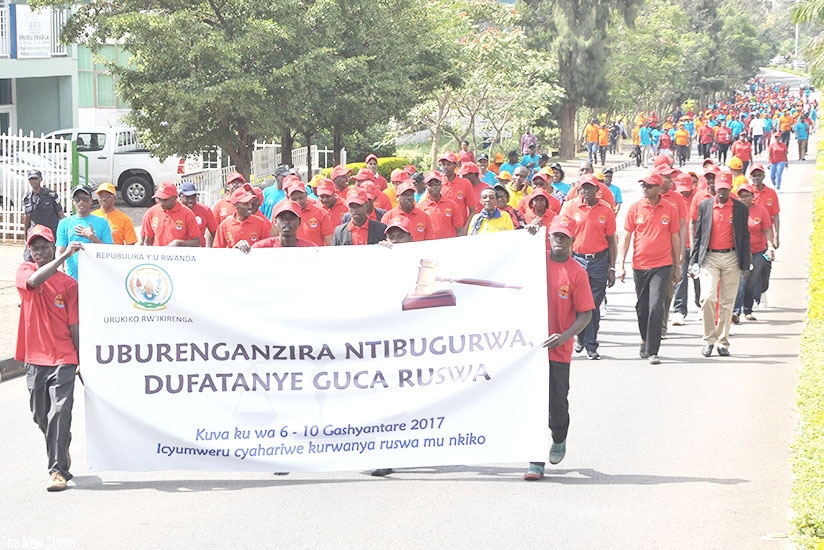The latest Corruption Perception Index launched last week by Transparency International, among other revelations, pointed to significantly low reporting of corruption cases by the general public.


The latest Corruption Perception Index launched last week by Transparency International, among other revelations, pointed to significantly low reporting of corruption cases by the general public.
Over the last few years, Rwanda has been going up in rankings under the index. In 2010, the country ranked 66th globally while in the most recent release Rwanda was ranked 48th (improving two places from 2016) and third in the continent.
Rwanda scored 55 per cent in the latest report, up from 54 per cent in the previous one.
The report’s authors say that an improvement by a percentage point in the corruption perception index is likely to lead to a 0.5 per cent improvement in the Gross Domestic Product.
The report shows that, among the major hindrances to fighting graft in Rwanda, is the fact that only 15 per cent of Rwandans come forth to report incidences of corruption with a majority of them reluctant.
This, the report’s authors and experts say, continues to be a major challenge and there is need to increase public awareness.
In a mini survey involving 20 people by The New Times only one resident claimed to have reported a bribery attempt.
Most of those interviewed said that they were quite unaware of the right authorities to reach out to when reporting corruption or the processes involved.
For instance, most said that they are unaware of the toll free line 199 (or website) under the Office of Ombudsman through which they can report corruption.
Others said they were not aware that one can report graft cases without being involved in the consequent investigation.
Among the reasons they are hesitant to report corruption cases is fear of going through the reporting process which could involve paperwork and investigations with the police.
"I am not sure I would want to go through the process of recording a statement or being involved in investigations if I went to the police,” Alphonse Kanamugire a shop attendant at Kisementi told The New Times.
Others said that they would be hesitant to report corruption or bribery incidences for fear that their word alone would not be good enough and that there is rarely evidence to back up such allegations.
With 2016 Rwanda Bribery Index saying that the bribes paid by Rwandans to access services such as social protection, justice or bank products was estimated at Rwf35.5 billion in 2016, trend could go even higher with the reluctance to report.
Experts say that this calls for continued awareness of not only corruption but of existing avenues to report graft that citizens would find easy and not bureaucratic.
Talking to The New Times, the Deputy Ombudsman in charge of Preventing and Fighting Corruption and related offences, Clément Musangabatware, said that to maintain the progress in fighting graft, they plan on increasing citizen involvement.
He said that over the recent years, there have been multiple progressive steps to reduce instances of corruption and adequate legal framework but more was required in regards to citizen mobilisation and education.
He said that this will also involve mobilising partnership with local media to increase awareness among the public on avenues to report corruption.
To maintain the corruption fight, Musangabatware said that the Government was increasingly rolling out several initiatives.
He cited the e-procurement process for public agencies, which he said reduces the chances of bribery as there is no contact between the procurement officers and bidders.
In addition, Musangabatware explained that public officials declaring their assets will be less likely to give false information as they are linking their system to local banks and the land authorities for automatic verification.
"Previously, we verified the assets manually whereby we gave banks and the land agency about a week to verify the assets declared by the officials. Now, it will be done automatically reducing any changes of influencing the process,” he said.
The Executive Director of Transparency International Rwanda, Apollinaire Mupiganyi, told The New Times that from their findings and recommendations, there is need for more public awareness on graft reporting mechanisms going forward.
"Reporting of corruption by witnesses and victims remains relatively low and not much can be done without information about the incidences,” he said.
He, however, said that the ongoing review of the penal code that, among other things include categorising embezzlement as a form of corruption will help Rwanda sustain graft fight.
According to the Ombudsman Office, corruption undermines constitutional rights, human dignity, and equality.
It also endangers the stability and security of society and undermines the institutions and values of democracy.
Anti-corruption activists describe graft as a social and ethical problem; whereby its fight requires changes in values, norms and behavioral patterns of society, which is usually a long and difficult process.
Effectively overcoming challenges, therefore, calls for involvement of different actors in the fight against corruption, activists say.
The measures highlighted by Musangabatware include strengthening the framework for participation of non-state actors; more capacity building on the part of the public to resist and report corruption; promoting national values as core values for the society; and enhancing professional standards in public service organisations among others.
editorial@newtimes.co.rw


